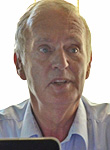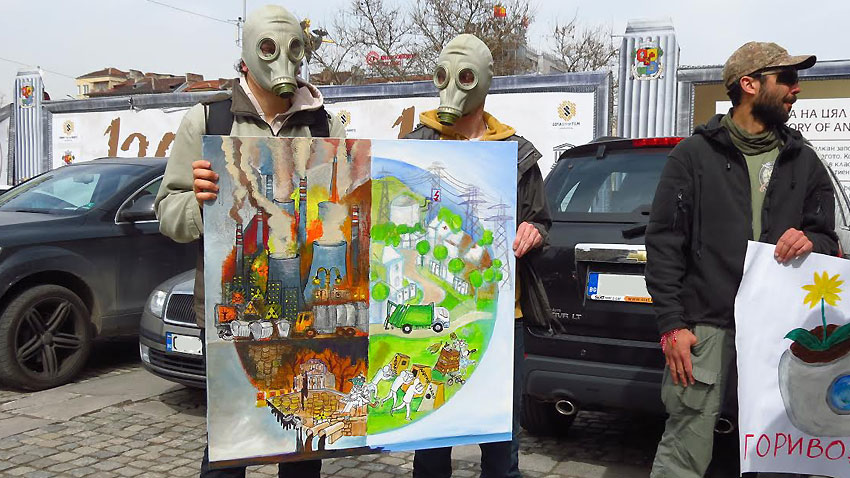The project for incineration of 180,000 tons of garbage per year in a plant of Toplofikaciya Sofia was a topic of discussion during an international conference entitled "From waste to energy – technology, projects, new options for municipalities and businesses," which took place in the Balkan Hotel downtown Sofia. The plant will burn refuse-derived fuel (RDF), obtained by shredding and dehydrating solid waste, for production of heat. What would the positive effects be? More from D. Eng Vassil Petrov from Toplofikaciya Sofia:
 "The environmental effect will come from the fact that we would find a permanent solution for the household waste of Sofia. We have overflowing landfills now and the plant would replace old worn-out equipment. It will emit lower levels of harmful emissions, compared to thermal plants burning natural gas. There will be a positive social effect too, as less natural gas will be used and the price of heating will be lower. This installation will be a good investment for the Sofia TPP and will allow the company to stabilize its financial condition. Separation and recycling also make sense as this process generates RDF that would be used for heating.”
"The environmental effect will come from the fact that we would find a permanent solution for the household waste of Sofia. We have overflowing landfills now and the plant would replace old worn-out equipment. It will emit lower levels of harmful emissions, compared to thermal plants burning natural gas. There will be a positive social effect too, as less natural gas will be used and the price of heating will be lower. This installation will be a good investment for the Sofia TPP and will allow the company to stabilize its financial condition. Separation and recycling also make sense as this process generates RDF that would be used for heating.”
 Several examples of similar installations existing abroad and their effects on the environment and economy were presented during the forum. Experts said that this technology prevented excessive pollution. Eng. Gerhard Lohe, who has been designing plants for processing waste into energy for years told us more about the opportunities for Sofia.
Several examples of similar installations existing abroad and their effects on the environment and economy were presented during the forum. Experts said that this technology prevented excessive pollution. Eng. Gerhard Lohe, who has been designing plants for processing waste into energy for years told us more about the opportunities for Sofia.
Some local residents, however, do not agree with experts and expect more pollution as a result of the waste incineration plant. They staged a protest in front of the hotel and gave deputy mayor of Sofia Municipality Maria Boyadzhieva a golden gas mask as an “award” for her contribution to the enrichment of Sofia air with chemicals. People complained that money comes before people’s health in the priority list of the authorities. Sofia residents also said that the ticket for participation in the conference, costing nearly 250 euro, made participation of local citizens in the forum impossible. Civic groups call for conducting a broad public discussion on waste management in the capital city as decisions affect the future of the city.

Danita Zarichinova of „For the Earth" NGO, that took part in the protest, told us about her opinion:
 "Speaking from an environmental point of view, there will be more air pollution. According to the report, emissions of fine particles, dioxins and other pollutants will be below EU standards for industrial pollution. But one should keep in mind that more pollution will be added to the already polluted air of Sofia. This winter fine particle levels reached 5 times above normal, without having a plant for waste incineration. We are also worried that the new plant will burn materials that can actually be recycled - paper, plastics, etc. Even food waste can be used for biogas production. Citizens of Sofia would also not receive revenues from recycling and composting. The plant will be built with EU money but the operating costs will be covered by taxpayers. Paying with one’s health for profit is awful. We should not forget that Sofia is surrounded by mountains and polluted air stays above the city.”
"Speaking from an environmental point of view, there will be more air pollution. According to the report, emissions of fine particles, dioxins and other pollutants will be below EU standards for industrial pollution. But one should keep in mind that more pollution will be added to the already polluted air of Sofia. This winter fine particle levels reached 5 times above normal, without having a plant for waste incineration. We are also worried that the new plant will burn materials that can actually be recycled - paper, plastics, etc. Even food waste can be used for biogas production. Citizens of Sofia would also not receive revenues from recycling and composting. The plant will be built with EU money but the operating costs will be covered by taxpayers. Paying with one’s health for profit is awful. We should not forget that Sofia is surrounded by mountains and polluted air stays above the city.”
Environmentalists offers separate collection of waste, giving as an example the city of Ljubljana, Slovenia, which has adopted a Zero Waste strategy, combining reusing, repairing, recycling, disposal and composting of waste with industrial practices such as eliminating toxins in packaging and changing product design.
English: Alexander Markov
In mid-September, the traditionally great Christian feast of the Holy Cross (September 14) marks the beginning of one of the most anticipated agricultural processes – the grape harvest campaign. 2025 is no exception, but due to a number of factors, the..
Bulgaria's Ministry of Finance placed 7-year government securities on the domestic market for 300 million leva. (144 million euros) and an interest rate of 3.25%. The submitted purchase orders amounted to 446 million leva with a coverage ratio of 1.49...
In August 2025, Bulgaria’s annual inflation rate stood at 5.3%, same as in July, according to data from the National Statistical Institute. Monthly inflation in August dropped to 0.1%, compared to 1.7% in July. Inflation measured from..
In its “Questions and Answers” section on the introduction of the euro, the Bulgarian National Bank has published a clarification on how the single..

+359 2 9336 661
